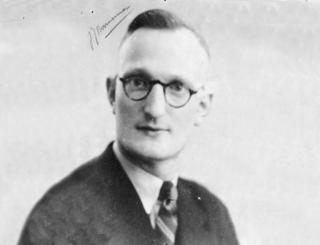Do you have a story as well? Have you been in hiding yourself, do you know a Frisian story about going into hiding or do you have any material concerning this subject, and would you like to share it with us. Please contact Tresoar.
search all hideout cards
The helpers
The organization and execution of helping people to hide was entirely dependent on people who were altruistically committed to this task. The ‘LO’, alone, had thousands of contributors all over the Netherlands who saw to the transportation, the first reception and the putting up and attending to of the people who went in to hiding. This does not even include the foster families. If so, the numbers would be a lot higher still.
The very first beginning
Helping people who were at risk of being arrested began in an improvised manner. Take Jacob de Jonge and his family for example. De Jonge was Jewish and in the thirties he was the owner of a company in the German town of Weener. After having been through various humiliating experiences and having spent time in prison he left Germany and settled in Leeuwarden. Here he managed a technical company. Not long after the Germans invaded the Netherlands the family once again was confronted by anti-jewish measures. He shared his concerns with the person who supervised his financial administration. His name was Krijn van den Helm. Van den Helm who was from Amersfoort got a job at the tax office in the Frisian capital. Just like his auditor Jan Evenhuis he was very much against the German discriminating and racist measures. Van den Helm promised to help De Jonge if necessary. In August of 1942 this was the case. De Jonge and his family received word they had to prepare for departure. Van den Helm took them to a person of kindred spirit in Heerenveen, after which they ended up in IJlst where they would remain hidden until liberation day. Their daughter Ruth was taken in by Van den Helm and his family. She, too, survived the war.
The network spreads
One thing led to another. Soon Van den Helm was called on again. Demand to accommodate Jewish children in particular came from Amsterdam. Students led by Piet Meeburg had already founded an organization there and the initial contacts with Friesland had been established. Krijn van de Helm started forming an organization in Friesland initially mainly comprised of reliable fellow tax officials. But it was not long before the network spread. Sjoerd Wiersma was to become an important pawn in the southwest of Friesland were he managed a laundry in the town of Joure. Hundreds of persecuted individuals subsequently traveled to Friesland to hide.
The caregivers
The caregiver had an important role to play. He was the one who regularly visited the people in hiding and their foster families who were in his charge. He took care of ration cards and money for the foster parents (in case this was agreed upon), and when it was necessary he arranged for hospital admittances and visits to doctors and dentists. And in case a Jewish person in hiding died of natural courses an illegal funeral had to be arranged.
The part of the women
Women deserve special attention in this respect. Her role concerning transport of Jewish children from the west of the Netherlands to Friesland has already been mentioned. Her role as hostess in whose care people hiding out were placed, however, was equally important. She had more mouths to feed and the laundry basket filled up quicker. On top of that we should keep in mind that it was she who answered the door when Germans or pro-German Dutchmen tried to gain access. Fear for what could happen to the people in hiding, her husband and herself has been enormous on occasion.
